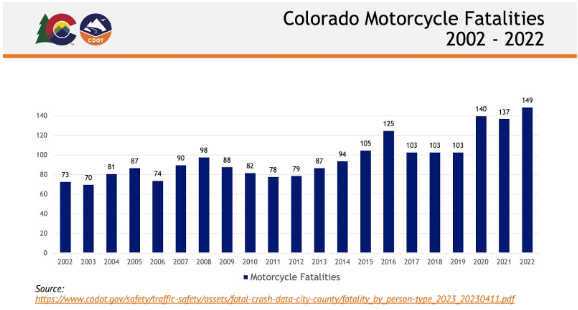
In 2022, 149 motorcyclists were killed on Colorado roads, representing 20% of the state’s total traffic fatalities but only 3% of the state’s vehicle registrations. So far this year, motorcycle deaths are down 22% compared to this time last year. To date, 21 motorcyclists have lost their lives on Colorado roads, down from 27 fatalities at this time last year.

Data from the National Highway Traffic Safety Administration (NHTSA) shows that speed and alcohol are large contributing factors in motorcycle crashes.
In Colorado, 75 of the 148 motorcycle fatalities in 2022 involved riders not wearing helmets. Helmets are a simple and effective way to reduce the likelihood of injury or death during a crash. Nationally helmet use has declined in the past few years. The use of DOT-compliant motorcycle helmets declined from 69% in 2020 to 65% in 2021. Helmet use was significantly higher in states that require all motorcyclists to be helmeted.
“Wearing a helmet can mean the difference between a minor injury and a catastrophic one,” said Darrell Lingk, director of the Highway Safety Office at CDOT. “A rider without a helmet is extremely vulnerable to a permanent or life-altering injury in a crash. So wear a helmet and other protective gear to make it home safely to your family.”
Last year, the counties with the most motorcycle deaths were El Paso (25), Jefferson (19), Adams (12), Denver (12), and Arapahoe (11).
On-going training can be an effective countermeasure to address motorcycle crashes. Colorado’s Motorcycle Operator Safety Training program is run by the Colorado State Patrol, which oversees 19 training courses across the state.
“It only takes one mistake to result in tragedy,” said Col. Matthew C. Packard, chief of the Colorado State Patrol. “Trained riders tend to be in fewer and less severe crashes. Make a commitment to follow traffic laws and ride with reduced risk by advancing your skills through training.”
One of the primary contributing factors to motorcyclist fatalities is speeding. According to NHTSA, 34% of all motorcycle riders involved in fatal crashes in 2020 were speeding, compared to 22% for passenger car drivers, 16% for light-truck drivers, and 7% for large-truck drivers. Motorcycle riders 25 to 29 years old involved in fatal crashes had the highest speeding involvement at 45%.
Alcohol impairment also plays a significant role in motorcycle-involved crash fatalities: 41% of the 2,158 motorcycle riders who died in single-vehicle crashes in 2020 nationwide were alcohol-impaired. In 2020, motorcycle riders involved (killed or survived) in fatal crashes had higher percentages of alcohol impairment than any other type of motor vehicle driver (27% for motorcycle riders, 23% for passenger car drivers, 19% for light-truck drivers, and 3% for large-truck drivers).
Drivers also need to use caution around motorcycles. Intersections are particularly dangerous since drivers of passenger vehicles often fail to see oncoming motorcycles. Therefore, CDOT recommends drivers and motorcyclists alike to keep the following tips in mind to reduce crashes:
- Observe all traffic laws and always obey the speed limit
- Drive and ride alcohol- and drug-free
- Avoid distractions such as phones or anything else that takes your eyes off the road
- Yield to motorcyclists, especially while turning at intersections
- Wear high-visibility personal protective gear and DOT-compliant motorcycle helmets
NHTSA data estimates that helmets saved 1,872 motorcyclists’ lives in 2017, and that 749 more lives could have been saved if all motorcyclists had worn their helmets. Learn how to identify a safe, DOT-compliant helmet at nhtsa.gov/motorcycle-safety/choose-right-motorcycle-helmet.
Support Northern Colorado Journalism
Show your support for North Forty News by helping us produce more content. It's a kind and simple gesture that will help us continue to bring more content to you.
BONUS - Donors get a link in their receipt to sign up for our once-per-week instant text messaging alert. Get your e-copy of North Forty News the moment it is released!
Click to Donate